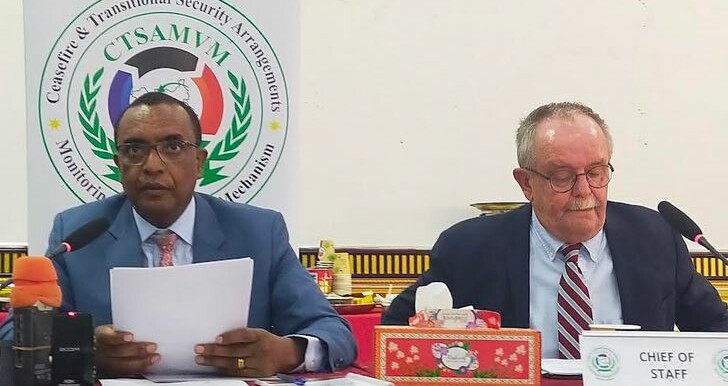The Ceasefire and Transitional Security Arrangements Monitoring & Verification Mechanism (CTSAMVM) on Thursday announced plans to reduce the number of monitoring teams due to a shortfall in funding.
Speaking during the Mechanism’s 38th Board Meeting in Juba, CTSAMVM Chairperson Maj. Gen. Hailu Gonfa Eddosa said they have already reduced the number of teams from 9 to 8 and will further reduce it to six teams.
“You should all be aware that CTSAMVM is facing challenging times. Although some donor support has been secured to enable the Mission to operate throughout this year, it is far less than we have previously enjoyed. We have to work within this new reality, and learn to manage with significantly reduced resources,” he said. “We have already downsized from 9 to teams 8 and we will be further downsizing to 6 teams. CTSAMVM is also facing significant challenges caused by the shortage of UN helicopters.”
Gen. Gonfa added: “Too often, despite the goodwill and cooperation of the UN, planned patrols are postponed or canceled.”
In his ceasefire monitoring report, the CTSAMVM boss said the ceasefire continues to hold, although there have been some worrying developments in Unity State following the change of allegiance of a senior SPLM/A-IO officer. He questioned why parties continue to change allegiance at this stage of the implementation of the agreement.
“It is difficult to understand why members of the Parties continue to change allegiance at this late stage?” he asked.
Gen. Gonfa revealed that there have also been issues caused by armed groups affiliated to the Parties, specifically the Agwelek Forces in Upper Nile State, stressing that it is vital that these groups are brought under control to prevent unnecessary outbreaks of violence.
He stated that in recent months, the Mechanism has recorded a decrease in the number of incidents attributed to the National Salvation Front (NAS) after a senior NAS commander changed allegiance to the Government in July last year. He however added that NAS remains in the field and the provisions of the Rome Declaration have to be realized yet.
“It appears there has been a proliferation of checkpoints on both the Nile and on some roads. There is evidence that access to the revenue from these checkpoints, particularly on the Nile, has been the cause of friction. There are also reports of increased criminality on some roads,” Gonfa further revealed, “There have also been issues in Jur River County in Western Bahr el Ghazal State. Inter-communal violence does not fall within the mandate of CTSAMVM, but we continue to monitor it in case of any overlap with the R-ARCSS.”
The head of the monitoring mechanism said that although the unified forces have been deployed, the number of forces deployed is far less than the number graduated.
“CTSAMVM is pleased to report that 6 battalions of the unified forces have been deployed. The Joint Defense Board (JDB) has stated that phase 1 deployment is now complete, although the numbers involved are far fewer than those who graduated at the training centers,” Gen. Gonfa stated. “Orders for phase 2 training have yet to be given, and from what CTSAMVM understands, resources have not yet been made available for the training to go ahead.”
He also raised concerns over a fatal shooting by an SSPDF soldier and extrajudicial killing of civilians and called on the army to investigate the incidents.
“Four of them concern fatal shootings by the SSPDF, and one other includes a non-fatal shooting by an SSPDF soldier. One is about an extra-judicial killing and the other four are about the shooting of civilians,” the General revealed and recommended, “It is the command responsibility of officers to ensure their soldiers have sufficient discipline and training to prevent these tragic incidents, and the fact that there have been so many suggests this is not happening. CTSAMVM recommends that the SSPDF takes all actions necessary to ensure that no troops are deployed without clear rules of engagement.”




